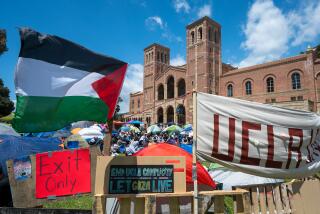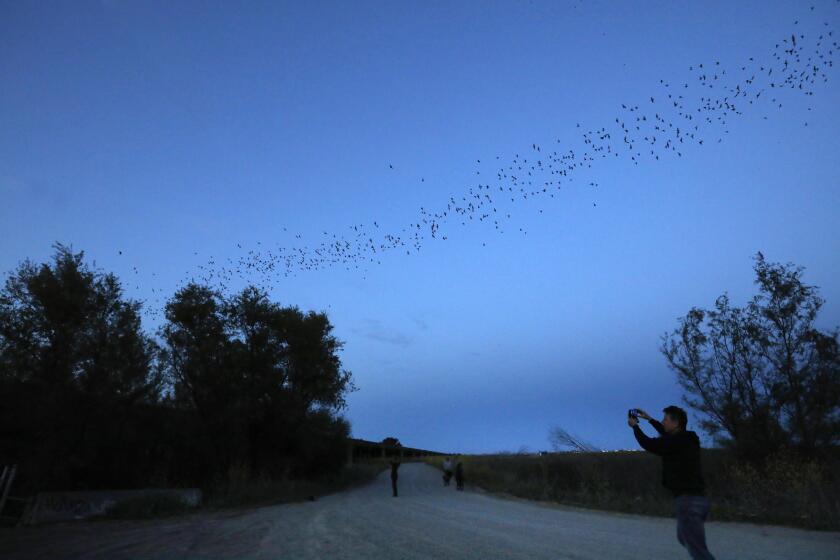Blocking hikers; defining “Holocaust”; excluding gays; opening Claremont School of Theology
Keeping hikers out
Re “Landowner puts his foot down on hiking,” June 27
I share Shull Bonsall Jr.’s worries about the land he owns near the falls and pools in the Los Padres National Forest. I don’t think that the public has a right to any land that any group -- conservationists or otherwise -- has deemed open to the public.
In fact, I would suggest that access to mountain or wilderness trails, pools and waterfalls across the state has in many cases led to their damage and demise through graffiti, trash and vandalism. As a hiker and trail runner, I have witnessed firsthand the ruin of what was once beautiful and untouched California land from cans, plastic bottles and just plain trash.
The teaching tool of access to the land comes at great cost to the environment. In the case of these trails, pools and waterfalls, this world would be a great and beautiful place if there were no people in it.
Victor Franco Jr.
Encino
Comparing ‘holocausts’
Re “A huge word made small,” Opinion, June 29
Fighting against trivialization, the Simon Wiesenthal Center’s Rabbi Marvin Hier seems to claim that no aspect of Third Reich fascism other than the Holocaust may be subject to comparison or discussion, and that the Middle English word “holocaust,” derived from ancient Greek, must be forever limited in use to Webster’s definition 3a: “the mass slaughter of European civilians and especially Jews by the Nazis during World War II.”
As enormously horrific as it was, the Holocaust has not rendered the writing of poetry “barbaric,” as Theodor Adorno said it had, and we shouldn’t let it obsolete rationality either.
John Norvell
Claremont
Rabbi Hier admonishes those who rightly compare the current plight of Latinos to the time before the full-blown horrors of the Holocaust.
Years before the gas chambers claimed its first victims, Jews were forced to live under the repressive Nuremberg Laws. These laws slowly began to isolate and restrict their movements. The Holocaust was a process before it became an event.
The rabbi instead should concern himself with exposing the ways that some states mirror the strategies of the emerging Third Reich.
I ask Jewish Americans to stand with the Latino community and not look to establish hierarchies of suffering as yardsticks of moral entitlement and division.
If a rabbi cannot find the connections between the universal patterns of hate, then, truly, we all may be lost.
Fredi Avalos
San Diego
Thank you, Rabbi Hier, for accurately defining the word “holocaust.”
I am troubled by the repeated references to a forest fire or a plane crash as a holocaust.
“Holocaust” is not a word to be uttered during every serious or even catastrophic event. To do so trivializes the enormity of the evil perpetrated by Hitler and tacitly approved by those who did nothing to stop it.
Those who, for whatever their passion about an issue, invoke the word “holocaust” are insensitive to the need to place that dreadful part of our history in the unique pantheon of shame that it deserves.
Sherri Lipman
Fullerton
Hier includes using the term “holocaust” to refer to abortion as one of the ways the term is being trivialized nowadays.
There are 1 million abortions per year in the U.S. — 42 million abortions per year worldwide. Each abortion is a human life terminated. The only way one could not be moved by these figures and could call this a trivial comparison would be if he thinks these lives are somehow worth less. And isn’t that really what the Holocaust was all about?
Hier quotes a mother’s statement to Rudolf Hoess as she and her children went to their deaths: “How can you murder these beautiful, darling children? Don’t you have any heart?” Those heartbreaking words could well be said now if we took time to really think about what each abortion really accomplishes.
So, no, Rabbi Hier, this is one case where a huge word is not made too small. But then again, maybe abortion merits its own, just-as-horrible word.
Catherine Walton
Buena Park
Christian club’s exclusion of gays
Re “High court supports UC in bias case,” June 29
I cannot agree with the Supreme Court ruling that a UC student group supposedly “excluded gays.”
This group only excluded “unrepentant participation in or advocacy of a sexually immoral lifestyle” — i.e., sex outside marriage. This also excluded heterosexuals who engage in sex outside marriage. What could be more equitable?
This is merely requiring a code of ethics for entrance into a group. Those in the military and Congress take an oath. How is this different from that? This is not discrimination, but a desire to be a cut above.
Connie Veldkamp
San Clemente
Re “Who can join a Christian club?,” Editorial, June 30
The Times apparently is not aware of the difference between religious freedom and bigotry.
You believe that the club argued persuasively that members must abide by its religious principles, and then go on to suggest that Hastings’ “all comers” policy that Justice Ruth Bader Ginsburg stated as constitutional would lead to bizarre results such as Jewish groups having to admit Christians.
I doubt there are many Jews who are also Christian, and vice-versa — but there are many gays who are also Jewish, Christian and other denominations.
Your lack of understanding is troubling.
Stephen Shane
Van Nuys
I am disappointed with The Times’ stance on this issue. The issue isn’t whether the Christian Legal Society has a right to discriminate. The issue is whether they can expect a public institution, UC Hastings College of Law, to recognize their group and all the attendant benefits that come from such recognition.
The CLS can discriminate all it wants to, but it cannot expect public funding and recognition for its views. I certainly do not want my tax dollars supporting a discriminatory and even hate-filled organization.
Contrary to The Times’ position, allowing such groups will only further segregate students from one another, hardening their particular opinions when they don’t have to accommodate persons with alternative views.
Arman Afagh
Riverside
Your editorial misses the point. Hastings allowed the club to meet on campus. The only things not allowed were access to the university’s e-mail system, bulletin boards and logo. The club was not banned.
I am a Christian but I am increasingly annoyed at the whining and crying of social conservative Christian groups. As Christians we should be open to anyone and everyone coming to our communities. Yes, Christian groups should welcome gays and lesbians, Jews, Muslims, even atheists — isn’t that what we are all about?
Gary Blinn
Montclair, Calif.
Theology school welcomes all
Re “Church lifts sanctions on theology school,” June 28
Bravo, Claremont School of Theology, and kudos to the United Methodist University Senate for permitting the training on campus of clergy from other religions as well as Christian pastors.
As a Christian (Presbyterian), I think it is vital that we learn about the beliefs and cultures of religions other than our own, especially as religious fanatics of many sorts resort to violence.
Perhaps if leaders of diverse religions can learn from each other in a collegial setting, we all will learn what we have in common — rather than what divides us.
This should go a long way toward preventing misunderstandings.
Kerstin Congleton
Canoga Park
Dangers that Abby didn’t face
Re “Thousands of Abbys,” Opinion, June 29
Karin Klein’s Op-Ed piece on teenagers and courage really hit the mark. I am so glad that someone has drawn our attention to a sometimes-invisible population: kids in tough neighborhoods for whom just arriving at school safely can be a battle.
The teenagers at Locke High School and many others have to combat hurdles that most of us can’t even imagine. As Klein so aptly noted, they often do it with very limited support of any kind.
I am in great admiration of these kids and their perseverance and courage, and I salute Klein for saluting them.
Melinda Wells
Laguna Niguel
More to Read
Sign up for Essential California
The most important California stories and recommendations in your inbox every morning.
You may occasionally receive promotional content from the Los Angeles Times.










